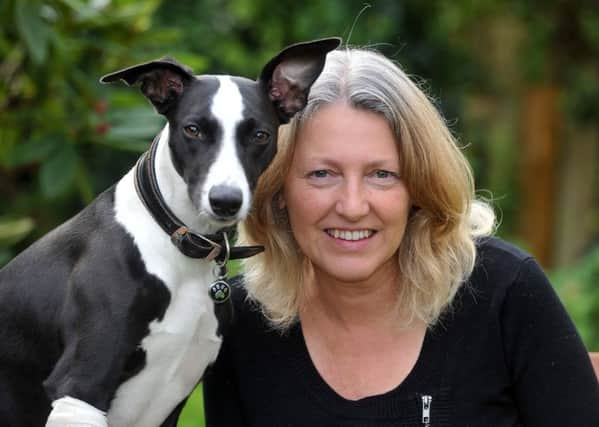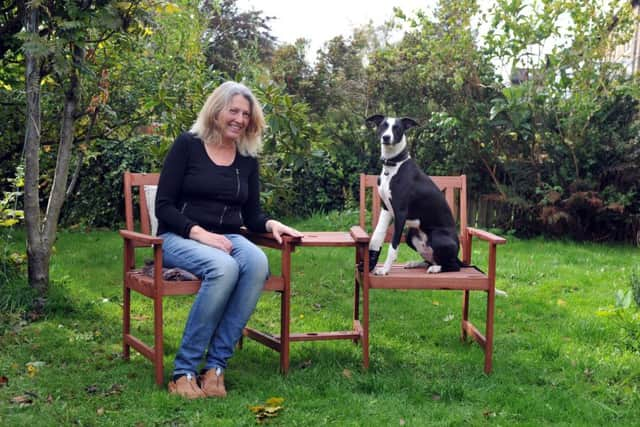When nature turned on poet Alison Lock as she took her dog on a morning pond-side walk


But on an empty, early spring morning this year, nature turned on her.
In a chain of events that sounds less like one of her landscape poems and more like the opening gambit of an episode of Inspector Morse, she set out to take Casper, the family whippet, for a walk alongside a canal-like mill pond hear her home in Meltham, south west of Huddersfield.
Advertisement
Hide AdAdvertisement
Hide AdA few hours later, she was laid out in hospital - her spine broken in seven places.


“I suppose all accidents are freaks by the very nature of them - but this certainly was,” she says.
“I was walking past a derelict mill site. It was first week of April - a very cold wind and the path was quite muddy and very close to the edge of the water - and I just slipped in.”
Her next memory is of being beneath the waterline, looking at the underside of the pond weeds.
Advertisement
Hide AdAdvertisement
Hide Ad“I think I’d hit my head - there was a bruise there,” she says.


“It was probably not very deep - maybe three or four feet of water - but I couldn’t get up, and I realised that I was hurting very badly.
“I was sinking back under the water and it was very cold. It was very isolated - there are no other dog walkers around that early in the morning, so I knew that if I was going to survive I had to get out.”
Alison managed to haul herself towards the bank but it took a superhuman effort to get clear of the water.
Advertisement
Hide AdAdvertisement
Hide Ad“There were some roots of heather just poking out at one point and they were just strong enough to hold my weight,” she says.
“I flung myself onto the bank and once I’d got there did a sort of body scan and I realised that I couldn’t get up. I couldn’t stand, I could hardly breathe.
“But I thought, well my legs aren’t broken, so I’ve got to use them to get out of here, because I was getting colder and colder and I’d probably have gone into hypothermia before much longer.”
Her escape route was to crawl for fully half a mile back to the main mill track, where there would be other dog walkers and early morning joggers to raise the alarm.
Advertisement
Hide AdAdvertisement
Hide Ad“I had to crawl all the way along this narrow path, just trying not to fall back in,” says Alison, 57.
“It was horrendous - absolutely horrendous. I had to just keep going and believe that I was going to get there.
“I still remember every stone, every bit of that ground that I crawled across.”
When she eventually reached the main path she still had to navigate streams and rocks before she was spotted.
Advertisement
Hide AdAdvertisement
Hide Ad“Eventually an ambulance came but I was in quite a bad state. I was very, very cold. But I think they thought it must be broken ribs or something, because I had moved so far from where I fell.
“It wasn’t until I got to hospital and they did tests and consulted with the spinal unit in Leeds that eventually they said, ‘You’ve got seven broken vertebrae’.”
Alison had not been carrying a mobile phone, but says the absence of a signal would have rendered one useless. “Besides, it would have just gone underwater,” she points out.
Her recuperation has been long and painful, and although she now enjoys some “pain free time” on many days, the process is far from over.
Advertisement
Hide AdAdvertisement
Hide Ad“I was in a body and neck brace. I’d injured my thoracic and lumbar spine and I couldn’t move at all for a few weeks.
“That was a period of great reflection. Breaking your back in seven places is something you are lucky to survive - but of course there was the concern that I might lose various functions or that I might be paralysed.
“It was fortunate that the vertebrae were scattered in a way that left enough good bone between them. So they said - rest and there’s a chance that you’ll just heal.
“I’ve been so very lucky.”
Alison is out of her back brace now, but still needs a stick to help her balance.
Advertisement
Hide AdAdvertisement
Hide Ad“I have to be very aware of my limits because once the pain starts I can’t do anything.
“But I can see the light at the end of the tunnel now.”
She has not taken Casper walking since the accident, but she is venturing out next week to her first public reading since it happened, in the self-styled “poetry village” of Marsden, just over the moor from Meltham.
The pubs there are stocked with books of verse, and at the local library next Wednesday, Alison will launch her third collection of poems, which she has called Revealing the Odour of Earth.
She had completed it, along with a collection of short stories, at the beginning of the year, and says the verse reflects, like her previous work, her love of her adopted home.
Advertisement
Hide AdAdvertisement
Hide AdOriginally from Devon, she began he journey north via university in Coventry and then did her masters degree at York St John University.
“I’ve been here in West Yorkshire for 28 years now, so my children have grown up here,” she says. “I’m very much rooted.”
But although she has started tentatively to write down her accident and recovery, with a pencil while lying on her back, she has not decided whether to go public with it.
“I’m one of those writers who has to write, so I started putting a little bit down about my experience, a lot of it in poetry. But whether I will ever get it published I don’t know.
Advertisement
Hide AdAdvertisement
Hide Ad“It’s my own personal reflection, but I suppose if other people are interested I might send it out.”
Another chapter for verse village
ALISON LOCK describes her latest poetry collection as “landscape made language”.
“I suppose it’s to do with an appreciation of the landscape and what we can learn from being out in nature,” she says.
The launch at Marsden Library at 7pm next Wednesday is the latest chapter in the village’s campaign to do for verse what Hay-on-Wye has done for prose. Already noted for its annual jazz festival, held last weekend, the village also hosts a cuckoo festival in April to celebrate the arrival of spring.
Advertisement
Hide AdAdvertisement
Hide AdThe dialect poet Samuel Laycock was born in the village, as was Simon Armitage, who was unveiled this week as the first professor of poetry at Leeds University, and who still writes about his time there.